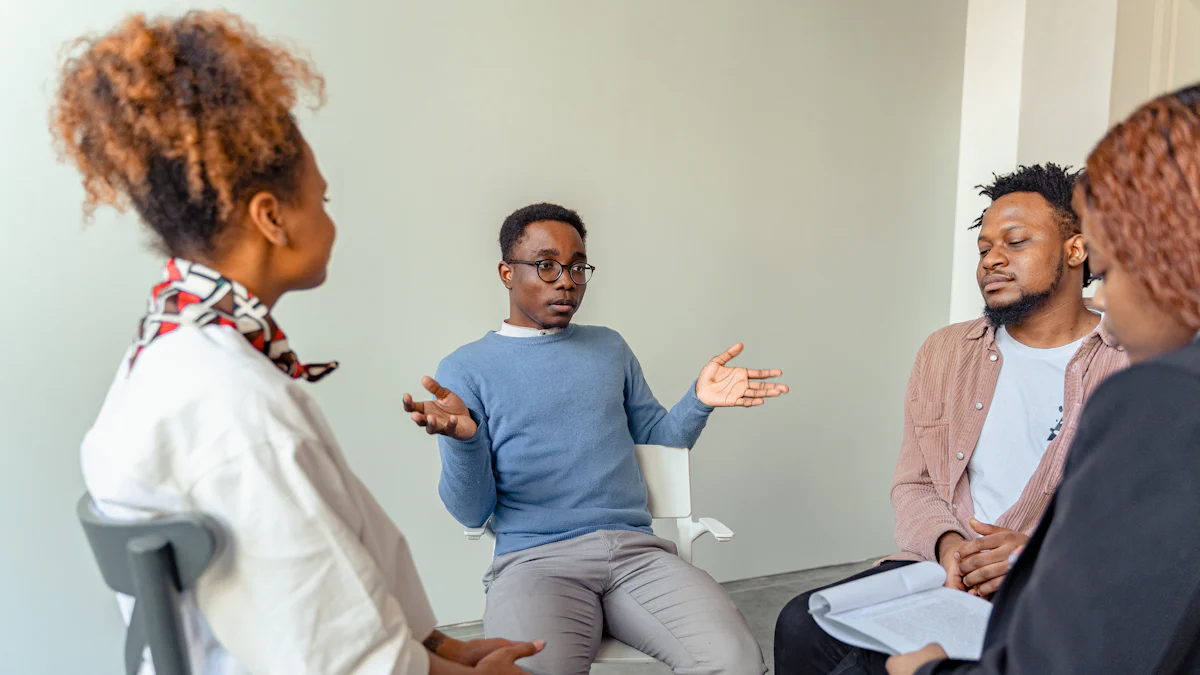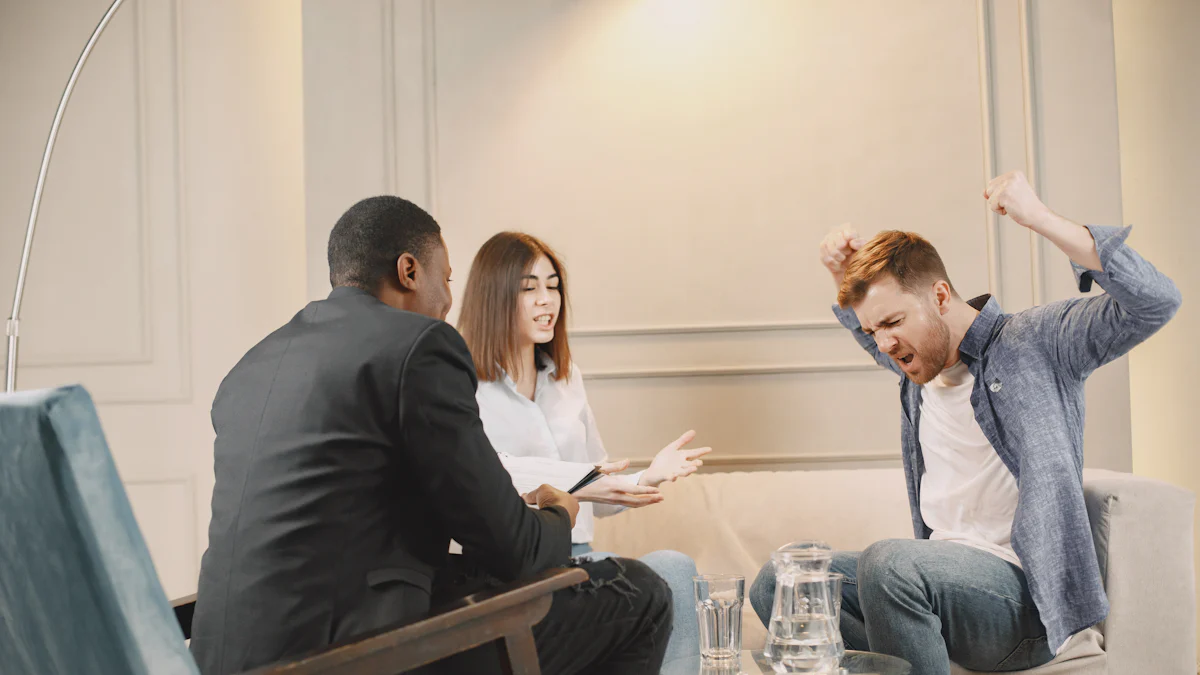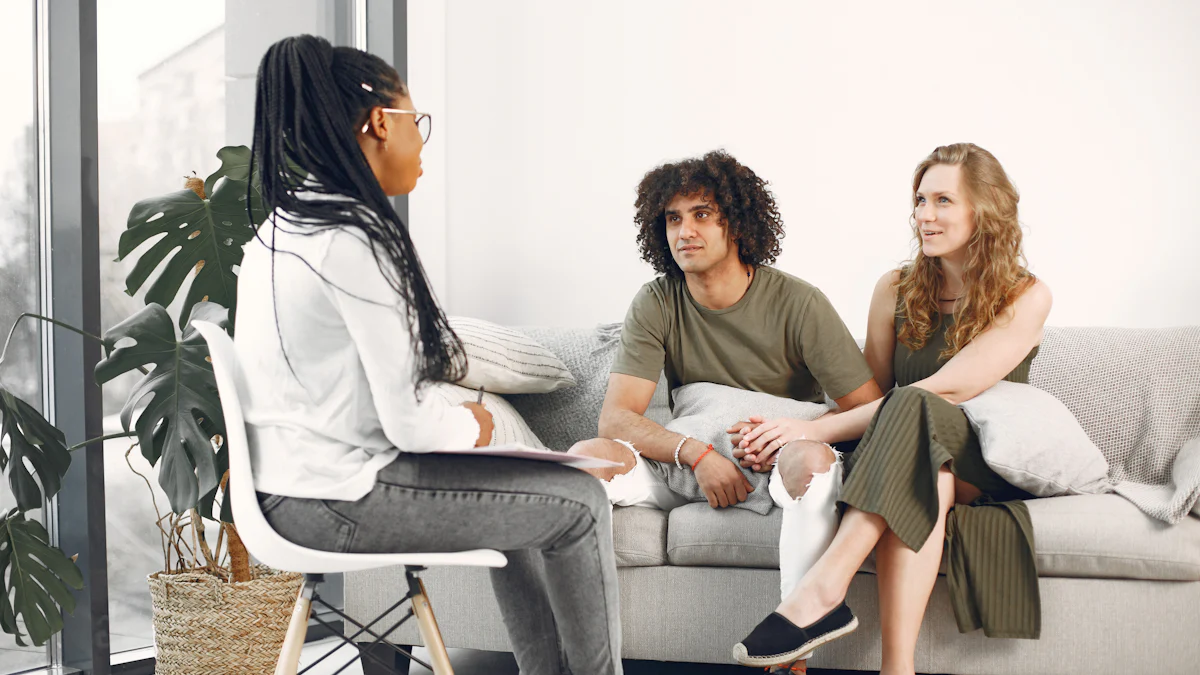Exploring the Basics of Couples Therapy

Couples therapy serves as a vital tool for enhancing relationship dynamics. Understanding the basics of this therapeutic approach can significantly improve communication and satisfaction between partners. Studies reveal that couples therapy positively impacts 70% of participants, highlighting its effectiveness. The modern world presents unique challenges for relationships, making the relevance of couples therapy more pronounced. Platforms like Myloves offer innovative solutions, such as AI lover interactions, to support relationship growth and exploration. Embracing these resources can lead to meaningful improvements in relationship quality.
Understanding Couples Therapy
Definition and Purpose
What is Couples Therapy?
Couples therapy involves a structured form of psychotherapy. This therapy aims to help partners improve their relationship dynamics. Therapists work with couples to address conflicts and enhance communication. The process often involves exploring the roots of current issues. This exploration helps in resolving dysfunctional patterns.
Goals and Objectives
The primary goals of couples therapy include repairing relationships and improving communication. Therapy also focuses on enhancing individual self-awareness. Couples learn to manage conflicts effectively through therapy. The process aims to increase relationship satisfaction. Research shows that couples therapy can help partners move from conflict to emotional connection.
Types of Couples Therapy
Emotionally Focused Therapy (EFT)
Emotionally Focused Therapy (EFT) centers on emotions and emotional regulation. EFT helps partners develop bonds and trust within their relationship. This therapy focuses on creating secure emotional connections. EFT often leads to improved intimacy between partners. Studies highlight the effectiveness of EFT in developing strong relational bonds.
Cognitive Behavioral Therapy (CBT)
Cognitive Behavioral Therapy (CBT) addresses negative thought patterns. CBT helps partners change behaviors that harm the relationship. This therapy focuses on enhancing problem-solving skills. CBT encourages partners to express emotions constructively. The approach aims to improve overall relationship satisfaction.
Imago Relationship Therapy
Imago Relationship Therapy (IRT) emphasizes understanding unconscious factors. IRT sessions focus on healing childhood wounds affecting relationships. The therapy aims to transform conflict into opportunities for growth. IRT helps partners achieve greater empathy and understanding. Research indicates that 12 IRT sessions can benefit distressed couples significantly.
Benefits of Couples Therapy

Enhancing Communication
Active Listening Techniques
Active listening techniques play a crucial role in couples therapy. Therapists teach partners to focus on understanding rather than responding. This approach encourages partners to fully engage with each other's words. Eye contact and nodding demonstrate attentiveness. Reflecting back what the other person says ensures clarity. These techniques foster a deeper connection between partners.
Expressing Emotions Effectively
Expressing emotions effectively enhances communication in relationships. Couples therapy provides tools for articulating feelings clearly. Partners learn to use "I" statements to express personal emotions. This method reduces blame and defensiveness. Sharing emotions openly builds trust and empathy. Improved emotional expression leads to increased intimacy and understanding.
Conflict Resolution
Identifying Core Issues
Identifying core issues is essential for resolving conflicts. Couples therapy helps partners uncover underlying problems. Therapists guide couples in recognizing patterns that cause disputes. Understanding these root causes allows for targeted solutions. Addressing core issues prevents recurring arguments. This process strengthens the relationship foundation.
Developing Problem-Solving Skills
Developing problem-solving skills is a key benefit of couples therapy. Therapists equip partners with strategies to tackle challenges. Structured approaches encourage collaborative decision-making. Partners learn to brainstorm solutions together. Evaluating options and agreeing on actions fosters cooperation. Effective problem-solving enhances relationship satisfaction and stability.
The Process of Couples Therapy

Initial Assessment
Understanding Relationship Dynamics
Therapists begin the couples therapy process by assessing relationship dynamics. This assessment provides insights into how partners interact with each other. Therapists observe communication patterns and emotional responses. This observation helps identify areas needing improvement. Understanding these dynamics forms the foundation for effective therapy.
Setting Therapy Goals
Therapists collaborate with couples to set therapy goals. These goals guide the therapeutic journey. Clear objectives ensure that sessions remain focused and productive. Goals often include improving communication and resolving conflicts. Setting specific targets enhances the likelihood of achieving desired outcomes.
Therapy Sessions
Frequency and Duration
Therapy sessions typically occur weekly. Ninety-minute sessions prove more effective than traditional 50-minute ones. Longer sessions allow for deeper exploration of issues. Extended time facilitates more meaningful progress. Consistent scheduling helps maintain momentum in therapy.
Techniques and Exercises Used
Therapists employ various techniques and exercises during sessions. Role-playing exercises help partners practice new communication skills. Therapists use guided discussions to address sensitive topics. Mindfulness exercises promote emotional regulation and awareness. These techniques enhance the therapeutic experience. Practical exercises empower couples to apply learned skills in daily life.
Introducing Myloves
How Myloves Supports Couples Therapy
Features and Benefits
Myloves offers innovative features that enhance couples therapy. The platform provides users with the ability to create an AI lover. This feature allows partners to explore relationship dynamics in a safe environment. Users can customize their AI lover to reflect personal preferences. This customization includes personality traits and communication styles. Myloves employs advanced technologies for realistic interactions. These technologies include natural language processing and text-to-image generation. The platform ensures privacy and data security for all users. Myloves enhances therapy by offering unique insights into relationship patterns.
User Testimonials
Users of Myloves report positive experiences with the platform. Many couples find that interacting with an AI lover improves communication skills. The platform helps partners express emotions more effectively. Users appreciate the opportunity to explore different relationship scenarios. Testimonials highlight increased empathy and understanding between partners. Many individuals note improved problem-solving skills after using Myloves. The platform receives praise for its user-friendly interface and engaging features. Myloves continues to support couples in achieving their therapy goals.
Integrating Myloves into Therapy
Practical Applications
Therapists can integrate Myloves into couples therapy sessions. The platform serves as a tool for practicing communication techniques. Partners can engage with an AI lover to simulate real-life interactions. This practice helps couples develop active listening and emotional expression skills. Therapists can use Myloves to identify patterns in relationship dynamics. The platform provides valuable insights into areas needing improvement. Myloves offers a flexible approach to enhancing traditional therapy methods.
Enhancing Therapy Outcomes
Myloves contributes to improved therapy outcomes for couples. The platform encourages partners to explore new ways of relating to each other. Interactions with an AI lover build confidence in communication abilities. Myloves supports the development of trust and intimacy between partners. The platform facilitates the exploration of unresolved issues in a non-threatening manner. Couples experience greater satisfaction and stability in their relationships. Myloves proves to be a valuable resource for achieving lasting change.
Considerations and Challenges
Finding the Right Therapist
Qualifications and Experience
Selecting a therapist with the appropriate qualifications is crucial for effective couples therapy. Therapists should possess a degree in psychology or counseling. Certification in couples therapy further enhances their credibility. Experience in handling diverse relationship issues is essential. A seasoned therapist understands complex dynamics within relationships. This expertise aids in addressing specific challenges faced by couples.
Compatibility with the Couple
Compatibility between the therapist and the couple plays a significant role in therapy success. Couples should feel comfortable discussing sensitive topics with the therapist. A therapist's communication style should align with the couple's preferences. Compatibility fosters trust and openness during sessions. Couples should assess initial interactions to gauge this compatibility. A positive rapport with the therapist enhances therapeutic outcomes.
Overcoming Resistance
Addressing Stigma
Stigma surrounding couples therapy often deters individuals from seeking help. Misconceptions about therapy can create barriers to participation. Educating couples about the benefits of therapy reduces stigma. Highlighting success stories can encourage reluctant partners. Couples should view therapy as a proactive step towards improvement. Addressing stigma involves normalizing therapy as a tool for growth.
Encouraging Participation
Active participation from both partners is vital for therapy effectiveness. Therapists emphasize the importance of commitment to the process. Partners should attend sessions regularly and engage fully. Encouragement from therapists helps overcome initial resistance. Couples should set clear goals to maintain focus and motivation. Participation leads to meaningful progress and relationship enhancement.
Couples therapy plays a crucial role in enhancing relationship dynamics. Many individuals, like Pema Bakshi, find that therapy provides space to understand partners beyond personal hurt. Seeking therapy can lead to significant improvements in communication and conflict resolution. Rachel B., 32, highlights learning effective communication strategies, such as taking breaks during heated discussions. Tools like Myloves offer innovative ways to support therapy by simulating real-life interactions. These resources empower couples to explore new dimensions of their relationships, fostering growth and understanding.
See Also
Strategies for Enhancing Your Relationship with Artificial Intelligence
Becoming Proficient in Online Conversations with Women
Advice for Strengthening Your Bond with Your Artificial Intelligence Girlfriend
Techniques for Improving Your Experience with a Virtual Boyfriend
Mastering the Settings of Your Artificial Intelligence Boyfriend